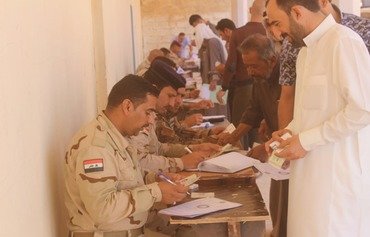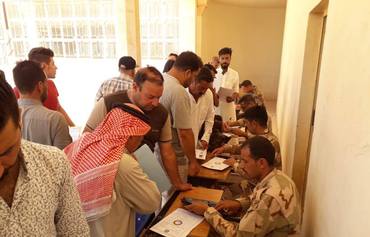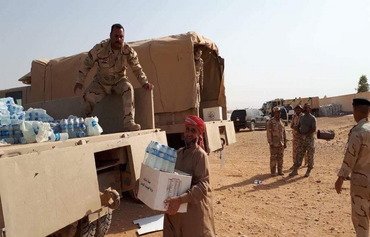Displaced Iraqis seeking to return to the western Anbar city of al-Qaim are being asked to submit to rigorous security checks, Iraqi officials told Diyaruna.
These checks are designed to prevent "Islamic State of Iraq and Syria" (ISIS) elements from infiltrating into al-Qaim, which lies just across the border from Syria, where the group still has a presence, they said.
Security personnel conduct hundreds of identity checks each day inside eastern Anbar camps housing internally displaced persons (IDPs), before granting them permission to return to their homes in al-Qaim and other areas.
The checks are "very stringent", al-Qaim mayor Ahmed Jidyan al-Dulaimi told Diyaruna, adding that it is "unlikely that any infiltration will occur".
"Specialised officers are posted in the camps set up for al-Qaim IDPs in eastern Anbar, like the Ameriyat al-Fallujah camp and Kilo-18 camp in Ramadi," he said.
The officers, who represent security agencies including National Security, Counter-terrorism Intelligence, local police and Army Intelligence, "examine the security risk of every single IDP", al-Dulaimi said.
When it has been confirmed that an IDP is not wanted by any of those agencies, the person is granted a security permit and allowed to board convoys organised to transport IDPs from the camps to al-Qaim under security protection, he said.
"Once the returnees arrive, their permits are thoroughly checked at the checkpoint before they are allowed to enter the city," he added.
Security cordon around al-Qaim
Al-Qaim itself is surrounded by a tight security cordon manned by several units of the army, police emergency response forces, border guard forces and tribal forces, backed by air cover, al-Dulaimi said.
These units "protect the security of the border strip with Syria and the city of al-Qaim and do not allow any infiltration or border breach", he said.
Anbar provincial council member Farhan Mohammed recently met with security leaders to discuss intelligence reports indicating that militants are seeking to infiltrate into al-Qaim to facilitate communication with their leaders in Syria.
"We called for tightening security checks on all IDPs who wish to return and for scrutinizing their documents and proof of identity to ensure they do not pose any danger," he told Diyaruna.
Mohammed stressed the need to continue intelligence efforts, with the help of residents who were unable to leave al-Qaim due to the siege imposed by ISIS.
"These people are a rich source of intelligence," he said. "They can distinguish well between terrorists and non-terrorists, and they are the most concerned about the safety of their city, having long suffered from terrorism."
Hundreds return each day
The process of returning IDPs to their homes in al-Qaim "is proceeding in an orderly fashion and based on a tight security mechanism that is hard to breach", said al-Qaim local council chairman Nazim Bardan.
Returnees are arriving at an accelerating pace, he told Diyaruna, pointing out that since the city was liberated on November 23rd, more than 8,000 families have returned of the 30,000 families who were displaced.
"Hundreds of people undergo personal data checks every day and await their turn to return to the city," he said, noting that the return process is currently limited to IDPs living in camps.

![Displaced al-Qaim residents wait as security personnel check their permits before they are allowed to return to the city. [Photo from the Facebook page of al-Qaim deputy governor Ahmad al-Dulaimi]](/cnmi_di/images/2018/02/09/11248-Iraq-Qaim-security-600_384.jpg)






